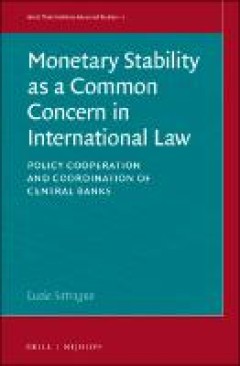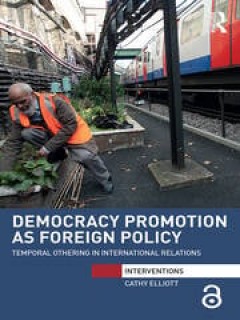Filter by

The Post-Election Violence in Kenya
Since the historic Nuremberg Trial of 1945 an international customary law principle has developed that commission of a core crime under international law – war crimes, genocide, crimes against humanity and aggression – should not go unpunished. History shows, that when in Africa such violations occurred, especially as a result of election disputes, national and regional actors, including…
- Edition
- 1
- ISBN/ISSN
- 978-94-6265-041-1
- Collation
- Hukum
- Series Title
- International Criminal Justice Series
- Call Number
- 340

The Politics of Pharmaceutical Policy Reform
Brazil is renowned worldwide for its remarkable reforms in pharmaceutical regulation, which have enhanced access to essential medicines while lowering drug costs. This book innovates by analysing the generic drug reform in Brazil, demonstrating that pharmaceutical regulation is only partially influenced by non-state actors. Little is known about the institutional antecedents and policy process…
- Edition
- 1
- ISBN/ISSN
- 978-3-319-12565-7
- Collation
- Politik
- Series Title
- SpringerBriefs in Political Science
- Call Number
- 324

The Political Economy of Schooling in Cambodia
In the most in-depth look at education in Cambodia to date, scholars long engaged in research on Cambodia provide historical context and unpack key issues of high relevance to Cambodia and other developing countries as they expand and modernize their education systems and grapple with challenges to providing a quality and equitable education.
- Edition
- 1
- ISBN/ISSN
- 978-1-137-45600-7
- Collation
- Ekonomi
- Series Title
- International and Development Education
- Call Number
- 330

The Political Economy of Higher Education Finance
This book analyzes the political economy of higher education finance across a range of OECD countries, exploring why some students pay extortionate tuition fees whilst for others their education is free. What are the redistributional consequences of these different tuition-subsidy systems? Analysing the variety of existing systems, Garritzmann shows that across the advanced democracies “Four …
- Edition
- 1
- ISBN/ISSN
- 978-3-319-29913-6
- Collation
- Ekonomi
- Series Title
- -
- Call Number
- 330

The Political Economy of Governance
Understanding the governance of nations is a key challenge in contemporaneous political economy. This book provides new advances and the latest research in the field of political economy, dealing with the study of institutions, governance, democracy and elections. The volume focuses on issues such as the role of institutions and political governance in society, the working of democracy and the …
- Edition
- 1
- ISBN/ISSN
- 978-3-319-15551-7
- Collation
- Ekonomi
- Series Title
- -
- Call Number
- 330

The Political Economy of Anti-dumping Protection
This book deals with anti-dumping measures (AD) and investigates two questions: First, what country characteristics affect AD use and notably, do domestic political institutions have an effect? Second, (how) is the decision to impose a new AD measure affected by anticipation of trading partners’ potential retaliation? This book applies a strategic perspective to AD to address these questions,…
- Edition
- 1
- ISBN/ISSN
- 978-3-319-11224-4
- Collation
- Ekonomi
- Series Title
- Contributions to Economics
- Call Number
- 330

Monetary Stability as a Common Concern in International Law: Policy Cooperati…
Monetary Stability as a Common Concern in International Law convincingly argues that monetary stability should be recognised as a Common Concern of Humankind. It also claims that international monetary reform is needed and it provides a template for reform based on the theoretical foundations of the emerging doctrine of Common Concern.
- Edition
- Ed. 1
- ISBN/ISSN
- -
- Collation
- -
- Series Title
- -
- Call Number
- -

Climate Change and Natural Disasters
ABSTRACT The Open Access version of this book, available at https://www.taylorfrancis.com/books/9781351527927, has been made available under a Creative Commons Attribution-Non Commercial-No Derivatives 4.0 license The start of the new millennium will be remembered for deadly climate-related disasters - the great floods in Thailand in 2011, Super Storm Sandy in the United States in 2012, and…
- Edition
- -
- ISBN/ISSN
- 9781315081045
- Collation
- -
- Series Title
- -
- Call Number
- -

Democracy Promotion as Foreign Policy
ABSTRACT This book looks at democracy promotion as a form of foreign policy. Elliott asks why democracy was seen to be the answer to the 7/7 bombings in London, and why it should be promoted not in Britain, but in Pakistan. The book provides a detailed answer to these questions, examining the logic and the modes of thinking that made such a response possible through analysis of the stories we …
- Edition
- -
- ISBN/ISSN
- 9781315618050
- Collation
- -
- Series Title
- -
- Call Number
- -

Researching Non-state Actors in International Security: Theory and Practice
This volume provides researchers and students with a discussion of a broad range of methods and their practical application to the study of non-state actors in international security. All researchers face the same challenge, not only must they identify a suitable method for analysing their research question, they must also apply it. This volume prepares students and scholars for the key challen…
- Edition
- Ed. 1
- ISBN/ISSN
- 9781317365303, 9780367141561
- Collation
- 270
- Series Title
- Routledge Critical Security Studies
- Call Number
- 337 RES r
 Computer Science, Information & General Works
Computer Science, Information & General Works  Philosophy & Psychology
Philosophy & Psychology  Religion
Religion  Social Sciences
Social Sciences  Language
Language  Pure Science
Pure Science  Applied Sciences
Applied Sciences  Art & Recreation
Art & Recreation  Literature
Literature  History & Geography
History & Geography